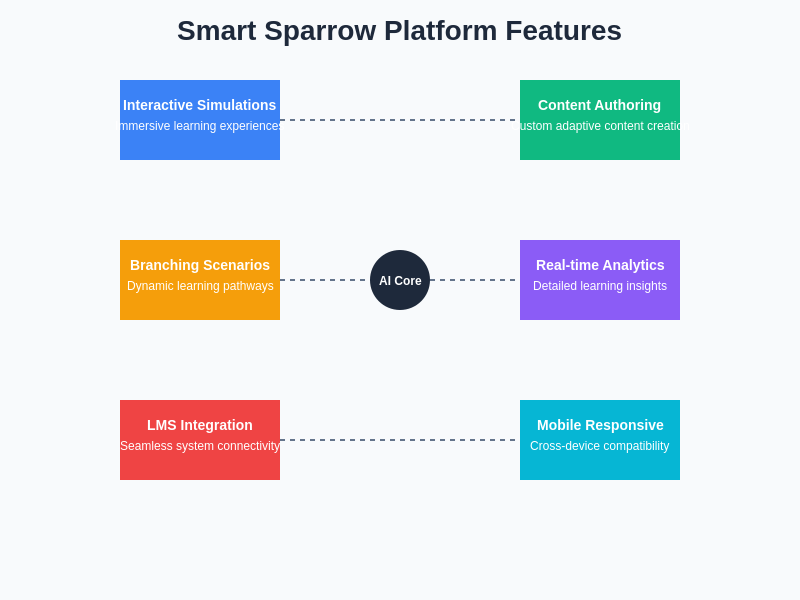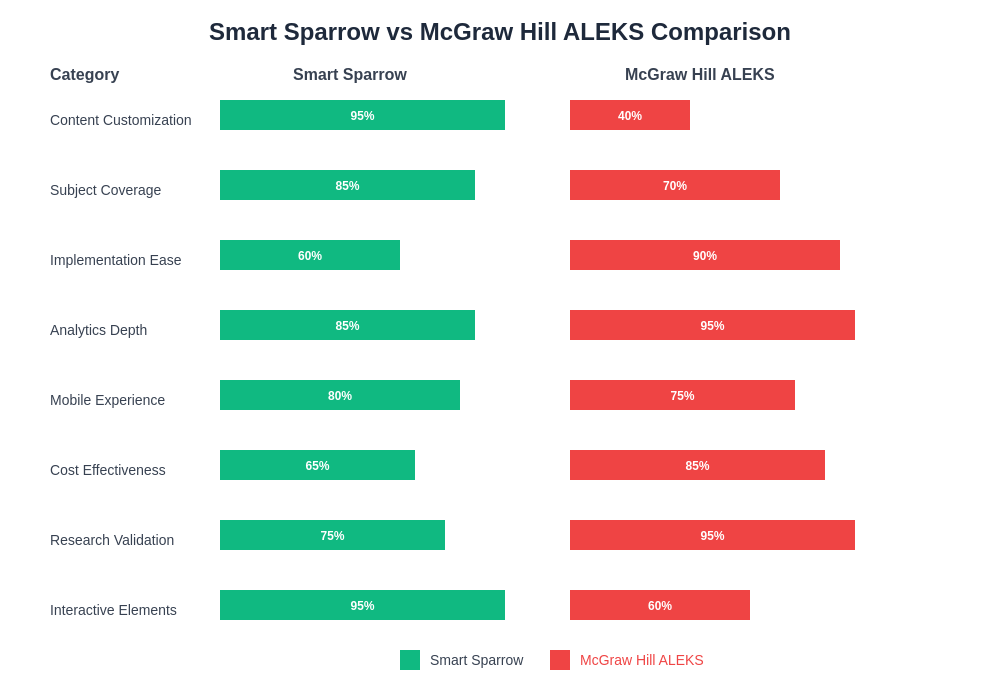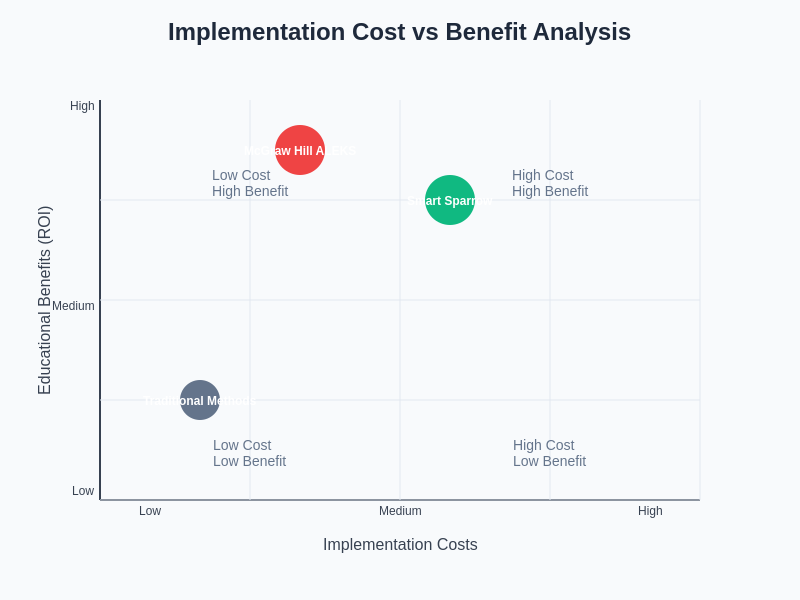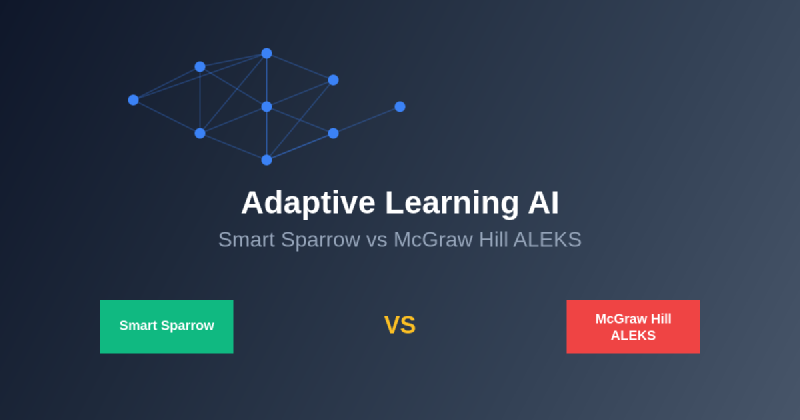The educational technology landscape has witnessed a transformative revolution with the emergence of adaptive learning artificial intelligence systems that personalize educational experiences based on individual student needs, learning patterns, and cognitive abilities. Among the most prominent platforms leading this educational transformation are Smart Sparrow and McGraw Hill ALEKS, two sophisticated adaptive learning environments that leverage advanced AI algorithms to create dynamic, personalized learning pathways for students across diverse academic disciplines and educational levels.
Explore the latest trends in educational AI technology to understand how adaptive learning platforms are reshaping modern education through intelligent automation and personalized instruction methodologies. The comparison between Smart Sparrow and McGraw Hill ALEKS reveals fundamental differences in approach, technological implementation, and educational philosophy that significantly impact student learning outcomes and institutional adoption strategies.
Understanding Adaptive Learning AI Technology
Adaptive learning artificial intelligence represents a sophisticated convergence of educational theory, cognitive science, and machine learning algorithms designed to create personalized educational experiences that respond dynamically to individual student performance, learning preferences, and knowledge gaps. Unlike traditional one-size-fits-all educational approaches, adaptive learning systems continuously analyze student interactions, assessment results, and learning behaviors to modify content difficulty, presentation style, and instructional sequence in real-time.
The underlying technology combines multiple AI methodologies including natural language processing for content analysis, machine learning algorithms for pattern recognition in student behavior, predictive analytics for learning outcome forecasting, and expert systems that encode pedagogical knowledge into algorithmic decision-making processes. These sophisticated systems create detailed learner profiles that encompass not only academic performance metrics but also learning style preferences, engagement patterns, and cognitive load management strategies.
Smart Sparrow and McGraw Hill ALEKS represent different philosophical approaches to implementing adaptive learning technology, with each platform emphasizing distinct aspects of personalization, content delivery, and learning analytics. Understanding these fundamental differences provides crucial insights for educators, administrators, and students seeking to optimize their educational technology investments and learning outcomes.
Smart Sparrow: Interactive Simulation-Based Learning
Smart Sparrow distinguishes itself in the adaptive learning marketplace through its emphasis on interactive simulations, immersive learning experiences, and sophisticated content authoring capabilities that enable educators to create highly customized adaptive learning modules. The platform’s strength lies in its ability to support complex, branching scenarios that respond to student choices and performance in ways that mirror real-world problem-solving situations.
The platform’s adaptive engine analyzes student interactions within these simulations to identify knowledge gaps, misconceptions, and learning preferences, then dynamically adjusts the learning pathway to address these identified needs through targeted interventions, supplementary content, and alternative explanation methods. This approach proves particularly effective in disciplines requiring hands-on experience, experimental learning, and application of theoretical concepts to practical scenarios.
Smart Sparrow’s content creation tools empower educators to design interactive lessons that incorporate multimedia elements, branching narratives, and responsive feedback mechanisms that adapt based on individual student performance patterns. The platform’s analytics dashboard provides detailed insights into student engagement levels, time-on-task metrics, and learning progression patterns that enable instructors to make data-driven decisions about curriculum modifications and individual student support strategies.

The platform’s simulation-based approach creates learning environments where students can experiment, make mistakes, and learn from consequences without real-world risks, fostering deeper understanding through experiential learning methodologies that traditional textbook-based instruction cannot replicate effectively.
McGraw Hill ALEKS: Mastery-Based Mathematical Learning
McGraw Hill ALEKS operates on a fundamentally different adaptive learning philosophy, focusing specifically on mathematics and science education through a mastery-based learning approach that emphasizes comprehensive knowledge assessment and systematic skill building. The platform’s artificial intelligence engine creates detailed knowledge maps for each student, identifying precisely what concepts they know, what they’re ready to learn, and what knowledge gaps must be addressed before progressing to more advanced topics.
Discover advanced AI learning capabilities with Claude to understand how intelligent tutoring systems can complement traditional educational approaches with personalized guidance and comprehensive knowledge assessment methodologies. ALEKS utilizes sophisticated mathematical algorithms to determine optimal learning sequences that build upon previously mastered concepts while introducing new material at appropriate cognitive load levels.
The platform’s assessment methodology employs adaptive questioning techniques that continuously probe student understanding across multiple knowledge domains, creating comprehensive learning profiles that guide instructional decision-making processes. Unlike traditional testing approaches that provide snapshot assessments, ALEKS maintains ongoing evaluation processes that update student knowledge states in real-time based on performance patterns and learning progression indicators.
ALEKS excels in providing detailed prerequisite knowledge identification, ensuring students possess foundational understanding before advancing to more complex mathematical concepts. This systematic approach prevents knowledge gaps from accumulating and creating barriers to future learning success, making it particularly effective for mathematics education where sequential skill building is essential for academic progress.
Technological Architecture and AI Implementation
The technological foundations underlying Smart Sparrow and McGraw Hill ALEKS reveal significant differences in AI implementation strategies, data processing methodologies, and learning analytics approaches that directly impact their effectiveness in different educational contexts and subject areas.
Smart Sparrow’s architecture emphasizes flexibility and customization, providing educators with comprehensive authoring tools that enable the creation of sophisticated interactive learning experiences without requiring extensive programming knowledge. The platform’s AI engine processes multiple data streams including user interaction patterns, time-spent metrics, choice selections in branching scenarios, and performance on embedded assessments to create dynamic learning pathways that adapt in real-time to student needs.
McGraw Hill ALEKS employs a more structured approach to AI implementation, utilizing advanced mathematical modeling techniques to create detailed knowledge state representations that precisely map student understanding across interconnected concept networks. The platform’s AI algorithms focus specifically on mathematical and scientific domain knowledge, enabling highly sophisticated analysis of conceptual understanding and prerequisite knowledge relationships that inform adaptive sequencing decisions.
Both platforms incorporate machine learning algorithms that improve their adaptive capabilities over time by analyzing aggregated student performance data, identifying successful instructional strategies, and refining their recommendation engines based on learning outcome correlations. However, their different focus areas result in distinct optimization strategies that reflect their respective educational philosophies and target disciplines.
Learning Analytics and Performance Measurement
The analytical capabilities of adaptive learning platforms provide crucial insights into student learning processes, enabling educators to make data-driven instructional decisions and students to understand their own learning patterns and progress trajectories. Smart Sparrow and McGraw Hill ALEKS offer substantially different approaches to learning analytics that reflect their underlying educational philosophies and technological implementations.
Smart Sparrow’s analytics dashboard emphasizes engagement metrics, interaction patterns, and learning pathway analysis that provide insights into how students navigate through interactive content and respond to different instructional approaches. The platform tracks detailed interaction data including time spent on specific activities, choices made in branching scenarios, and patterns of help-seeking behavior that enable instructors to identify students who may be struggling with particular concepts or learning approaches.
McGraw Hill ALEKS focuses its analytical capabilities on knowledge mastery assessment and learning progression tracking, providing detailed reports on concept mastery levels, prerequisite knowledge gaps, and optimal learning sequences for individual students. The platform’s analytics emphasize mathematical competency development and systematic skill building progression that enables educators to monitor student advancement through carefully structured curriculum sequences.
Enhance your research capabilities with Perplexity to access comprehensive information about educational technology trends and adaptive learning research that can inform implementation decisions and optimization strategies. The analytical insights provided by both platforms enable evidence-based educational decision-making that improves learning outcomes through personalized instruction strategies.
Content Development and Customization Capabilities
The ability to create, modify, and customize educational content represents a critical differentiator between adaptive learning platforms, directly impacting their suitability for different institutional needs, subject areas, and pedagogical approaches. Smart Sparrow and McGraw Hill ALEKS provide substantially different content development experiences that reflect their distinct educational philosophies and target user communities.
Smart Sparrow excels in providing comprehensive content authoring capabilities that enable educators to create sophisticated interactive learning experiences without requiring extensive technical expertise. The platform’s visual authoring environment supports the development of complex simulations, branching narratives, and multimedia-rich learning modules that can incorporate external resources, interactive elements, and adaptive feedback mechanisms tailored to specific learning objectives and student populations.
The platform’s flexibility extends to integration capabilities that allow incorporation of external content sources, learning management system connectivity, and custom assessment tools that enable institutions to leverage existing educational resources while benefiting from Smart Sparrow’s adaptive learning capabilities. This approach proves particularly valuable for institutions with established curriculum materials and specific pedagogical requirements that necessitate customized learning experiences.
McGraw Hill ALEKS operates on a more structured content model that emphasizes comprehensive curriculum coverage within mathematics and science domains through expertly designed learning sequences that have been refined through extensive educational research and field testing. While this approach limits customization flexibility, it ensures high-quality educational content that aligns with established academic standards and learning objectives.

The trade-off between customization flexibility and content quality represents a fundamental decision point for institutions considering adaptive learning platform adoption, with Smart Sparrow offering greater flexibility and ALEKS providing more refined, research-based content within its target domains.
Implementation Strategies and Institutional Adoption
Successful implementation of adaptive learning platforms requires careful consideration of institutional readiness, technological infrastructure, faculty training requirements, and student support systems that enable effective utilization of these sophisticated educational technologies. Smart Sparrow and McGraw Hill ALEKS present different implementation challenges and opportunities that institutions must evaluate based on their specific educational goals and organizational capabilities.
Smart Sparrow implementation typically requires more extensive faculty training and content development investment due to the platform’s emphasis on customizable interactive content creation. Institutions adopting Smart Sparrow must allocate resources for educator training programs that enable effective utilization of the platform’s authoring tools and adaptive learning features. However, this investment enables creation of highly customized learning experiences that align precisely with institutional pedagogical approaches and curriculum requirements.
The platform’s flexibility also necessitates ongoing content maintenance and updating responsibilities that require dedicated institutional resources and expertise. Successful Smart Sparrow implementations often involve collaborative content development teams that include subject matter experts, instructional designers, and educational technology specialists working together to create and maintain high-quality adaptive learning experiences.
McGraw Hill ALEKS offers a more straightforward implementation pathway due to its focus on pre-developed, research-validated content within mathematics and science domains. Institutions can typically deploy ALEKS more rapidly with minimal content development requirements, making it particularly attractive for organizations seeking immediate adaptive learning benefits without extensive upfront investment in content creation and faculty training.
However, ALEKS implementation success depends heavily on alignment between the platform’s structured approach and institutional pedagogical preferences, curriculum requirements, and student population characteristics. Institutions must carefully evaluate whether ALEKS’s mastery-based learning philosophy aligns with their educational goals and teaching methodologies.
Student Experience and Learning Outcomes
The ultimate measure of adaptive learning platform effectiveness lies in their impact on student learning outcomes, engagement levels, and educational satisfaction metrics that determine long-term adoption success and educational value creation. Comparative analysis of student experiences with Smart Sparrow and McGraw Hill ALEKS reveals distinct advantages and limitations that influence their suitability for different learning contexts and student populations.
Smart Sparrow’s simulation-based approach creates highly engaging learning experiences that appeal particularly to students who prefer hands-on, experimental learning methodologies. The platform’s interactive simulations and branching scenarios maintain student interest through varied content presentation styles and responsive feedback mechanisms that adapt to individual learning preferences and performance patterns.
Students using Smart Sparrow often report increased engagement with course material and improved understanding of complex concepts through experiential learning opportunities that traditional instructional methods cannot provide. The platform’s flexibility enables accommodation of diverse learning styles and preferences, making it particularly effective for heterogeneous student populations with varying educational backgrounds and learning needs.
McGraw Hill ALEKS provides a more structured learning experience that appeals to students who prefer systematic, sequential skill building approaches and clear progression indicators. The platform’s detailed feedback on knowledge mastery and prerequisite understanding helps students identify specific areas requiring additional attention and provides clear guidance for learning progression strategies.
Research studies indicate that ALEKS implementation often results in improved mathematics performance and increased student confidence in mathematical problem-solving abilities. The platform’s continuous assessment approach helps students maintain engagement with course material while providing immediate feedback on learning progress that enables timely intervention when difficulties arise.
Cost Considerations and Return on Investment
Economic factors play crucial roles in adaptive learning platform selection decisions, requiring careful analysis of total cost of ownership, implementation expenses, ongoing maintenance requirements, and measurable educational benefits that justify technology investments. Smart Sparrow and McGraw Hill ALEKS present different cost structures and value propositions that institutions must evaluate based on their budget constraints and educational priorities.
Smart Sparrow typically requires higher upfront investments due to content development requirements, faculty training costs, and ongoing maintenance responsibilities that institutions must assume for effective platform utilization. However, these investments enable creation of highly customized learning experiences that can provide long-term value through improved student outcomes and competitive differentiation in educational offerings.
The platform’s licensing model often includes content authoring capabilities and technical support services that reduce ongoing operational costs while enabling institutions to maintain control over their educational content and learning experiences. This approach proves particularly cost-effective for institutions with significant content development capabilities and long-term adaptive learning implementation strategies.
McGraw Hill ALEKS generally offers lower implementation costs due to minimal content development requirements and streamlined deployment processes that reduce faculty training and technical support needs. The platform’s subscription-based pricing model provides predictable ongoing costs that facilitate budget planning and financial management for educational technology investments.
However, institutions must consider potential limitations in customization capabilities and subject area coverage that may necessitate additional technology investments to meet comprehensive educational requirements. The total cost of ownership analysis should include evaluation of alternative platforms or supplementary technologies required to address educational needs not covered by ALEKS’s mathematics and science focus.

Return on investment calculations must incorporate both quantitative metrics such as improved student retention and academic performance alongside qualitative benefits including enhanced student satisfaction and competitive positioning in the educational marketplace.
Integration with Learning Management Systems
Seamless integration with existing learning management systems represents a critical factor in adaptive learning platform adoption success, determining ease of implementation, user experience quality, and operational efficiency for both educators and students. Smart Sparrow and McGraw Hill ALEKS provide different integration capabilities that significantly impact their suitability for institutions with established educational technology ecosystems.
Smart Sparrow offers comprehensive integration capabilities with major learning management systems including Canvas, Blackboard, Moodle, and other popular platforms through standardized protocols such as Learning Tools Interoperability standards. These integrations enable single sign-on authentication, grade passback functionality, and seamless content access that maintains consistent user experiences across different educational technology platforms.
The platform’s API capabilities also support custom integrations with institutional systems including student information systems, library resources, and specialized educational tools that enable comprehensive educational technology ecosystems. This flexibility proves particularly valuable for institutions with complex technology requirements and existing educational technology investments that must be preserved and leveraged effectively.
McGraw Hill ALEKS provides robust integration capabilities specifically optimized for mathematics and science course delivery within learning management system environments. The platform’s integrations emphasize grade synchronization, assignment distribution, and progress tracking functionalities that enable instructors to monitor student performance and manage course administration efficiently within familiar LMS interfaces.
However, ALEKS integration capabilities may be more limited in terms of content customization and external tool connectivity compared to Smart Sparrow’s more flexible integration architecture. Institutions must evaluate whether ALEKS’s integration capabilities align with their existing technology infrastructure and future expansion plans for educational technology adoption.
Future Developments and Platform Evolution
The rapidly evolving landscape of artificial intelligence and educational technology creates ongoing opportunities for adaptive learning platform enhancement and expansion that will significantly impact their long-term value and competitive positioning. Smart Sparrow and McGraw Hill ALEKS are both investing in platform improvements and capability expansions that reflect emerging trends in educational AI and learning analytics.
Smart Sparrow continues developing advanced AI capabilities including natural language processing for automated content analysis, machine learning algorithms for improved learning pathway optimization, and enhanced analytics tools that provide deeper insights into student learning processes. The platform’s roadmap emphasizes increased automation in content creation, more sophisticated adaptive algorithms, and expanded integration capabilities with emerging educational technologies.
Recent developments include improved mobile accessibility, enhanced collaboration tools for group learning activities, and advanced assessment capabilities that support competency-based education models. These enhancements position Smart Sparrow for continued relevance in evolving educational technology landscapes while maintaining its core strengths in interactive content creation and customization flexibility.
McGraw Hill ALEKS is expanding its subject area coverage beyond mathematics and science while maintaining its mastery-based learning philosophy and sophisticated assessment capabilities. Platform developments include enhanced data visualization tools, improved mobile applications, and advanced predictive analytics that enable early identification of students at risk of academic difficulties.
The platform’s evolution also includes integration with broader McGraw Hill educational ecosystems and enhanced interoperability with third-party educational tools that extend its utility within comprehensive educational technology implementations. These developments maintain ALEKS’s position as a leading adaptive learning solution while addressing some traditional limitations in subject area coverage and customization flexibility.
Conclusion and Recommendations
The comparison between Smart Sparrow and McGraw Hill ALEKS reveals two sophisticated adaptive learning platforms with distinct strengths, limitations, and optimal use cases that institutions must carefully evaluate based on their specific educational goals, technological capabilities, and resource constraints. Neither platform represents a universally superior solution, but rather each offers unique advantages that align with different educational contexts and implementation strategies.
Smart Sparrow excels in providing flexible, customizable adaptive learning experiences that enable institutions to create highly personalized educational content aligned with specific pedagogical approaches and curriculum requirements. The platform proves particularly valuable for institutions with strong content development capabilities, diverse subject area requirements, and commitment to long-term adaptive learning implementation strategies that justify higher upfront investments.
McGraw Hill ALEKS offers a more structured, research-validated approach to adaptive learning that delivers immediate benefits within mathematics and science education through sophisticated assessment capabilities and systematic skill building methodologies. The platform represents an excellent choice for institutions seeking rapid adaptive learning deployment with minimal content development requirements and proven effectiveness in mathematical education.
Institutional decision-making should consider factors including subject area requirements, customization needs, technical expertise availability, budget constraints, and long-term educational technology strategies that influence optimal platform selection. Many institutions may benefit from hybrid approaches that leverage multiple adaptive learning platforms for different educational contexts and requirements rather than seeking single-platform solutions for all adaptive learning needs.
The continued evolution of both platforms suggests that future developments will address current limitations while enhancing existing strengths, making ongoing evaluation and potential platform migration strategies important considerations for long-term educational technology planning and investment optimization.
Disclaimer
This article is for informational purposes only and does not constitute professional advice regarding educational technology selection or implementation. The analysis presented reflects current understanding of adaptive learning platforms based on publicly available information and general industry knowledge. Educational institutions should conduct thorough evaluations including pilot implementations, stakeholder consultations, and detailed cost-benefit analyses before making platform selection decisions. Individual results may vary based on specific institutional contexts, implementation approaches, and student populations.
